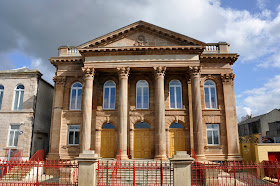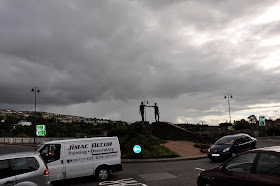But be ye doers of the word, and not hearers only, deceiving your own selves. For if any be a hearer of the word, and not a doer, he is like unto a man beholding his natural face in a glass: For he beholdeth himself, and goeth his way, and straightway forgetteth what manner of man he was. Pure religion and undefiled before God and The Father is this, To visit the fatherless and widows in their affliction and to keep himself unspotted from the world. 1 James 1:22-24, 27
The following article was found in my files and it seems like a worth while thought to pass on, even though I do not remember who gave this to me or where I got it, the print at the top of the page identifies it as coming from nowpublic.com.

"There are three kinds of people in the world today," Disney once wrote. "There are
'well poisoners,' who discourage you and stomp on your creativity and tell you what you can't do. [These are the negatives who put other people down and try to discourage them from achieving their dreams. They're people who should be avoided and whose advice should be ignored.]

There are
'lawn mowers'
--people who are well-intentioned but self-absorbed; they tend to their own needs, mow their own lawns and never leave their yards to help another person. [Lawn mowers may be good citizens who go to work each day, pay their bills and taxes, obey the laws, and maintain their property but seldom volunteer or get involved in their community.]
Finally, there are 'life enrichers'

--people who reach out to enrich the lives of others, to lift them up and inspire them. [These are the people who really make life worth living. They go out of their way to enhance the lives of others with encouraging words and deeds. They motivate others to have hope.] We need to be life enrichers, and we need to surround ourselves with life enrichers."
All of us have opportunities every day to be life-enrichers. It's as simple as offering a word of encouragement; volunteering our time, talents and treasures to enrich our schools, churches, government or community; or writing a note of thanks to a teacher, a pastor, a public servant or volunteer. God calls us to be life-enrichers. "Well-poisoners" try to build themselves up by tearing others down but never achieve relief from their misery. Many :lawnmowers" may achieve material success and even respect in this world, but people who serve others will be first in God's kingdom.
We all need to take time mowing our lawns, but take some time from mowing to get out of your own yard and take a few simple steps to be a life-enricher. Thank you child's teacher, let your children know you're proud of them, lend a neighbor a hand, volunteer at your church, be a mentor, help with a fund-raiser, put your talents to work for a charity, give blood, invite somebody to dinner, write a note of congratulations to a friend or relative who has achieved something special. You'll be amazed at how your words of encouragement, or your helping hand can have a dramatic impact on enriching another's life--and your own!





















































